For children with prosthetic limbs, life is about more than just physical adaptation. While prosthetic technology helps them move, play, and explore, their emotional well-being is just as important. Many children face challenges related to self-confidence, social interactions, and self-acceptance as they grow up with a prosthetic limb.
As parents, caregivers, and educators, providing strong emotional and social support can help children develop resilience, confidence, and a positive self-image. A child who feels accepted and encouraged is more likely to embrace their prosthetic limb as a part of who they are, rather than something that sets them apart.
At Robobionics, we believe in empowering children to live with confidence, independence, and joy. This article will explore practical strategies for providing social and emotional support, helping kids with prosthetic limbs feel strong, capable, and proud of who they are.
Helping Kids Build Self-Confidence
Confidence plays a big role in how a child feels about themselves and their prosthetic limb. A confident child is more likely to engage with peers, participate in activities, and take on new challenges without hesitation.
Encouraging Positive Self-Talk
The way children think and talk about themselves shapes their self-esteem. If they see their prosthetic as a limitation, they may feel self-conscious or withdrawn. Teaching them positive self-talk can help them see their prosthetic as a strength, not a weakness.
Instead of saying, “I can’t do this because of my prosthetic,” encourage them to say, “I can find a way to do this in my own way.” When they express frustration, remind them of their abilities, progress, and strengths. Help them reframe negative thoughts into empowering ones.
Celebrating Their Achievements

Every milestone—no matter how small—deserves to be celebrated. Whether it’s learning to walk with a prosthetic leg, tying their shoelaces with a prosthetic hand, or trying a new sport, acknowledging their achievements reinforces their sense of accomplishment.
Rather than focusing on what’s difficult, focus on their effort and progress. A simple “I’m proud of how hard you worked today” can go a long way in boosting their confidence and motivation.
Helping Them Take Ownership of Their Prosthetic
Children who take pride in their prosthetic limb feel more comfortable using it in public. Encourage them to personalize their prosthetic with stickers, colors, or unique designs. Some kids enjoy giving their prosthetic a name, treating it as a special part of their identity rather than just a medical device.
Letting children have a say in their prosthetic choices—from design to function—helps them develop a sense of control and ownership, making them more confident in their everyday activities.
Helping Kids Navigate Social Situations
Children with prosthetic limbs often worry about how others see them. While some kids may be naturally outgoing, others may feel shy, anxious, or hesitant in social situations. Teaching them how to handle questions, make friends, and set boundaries can make social interactions easier.
Preparing Them for Common Questions
Curiosity is natural, and children with prosthetic limbs will likely be asked questions by their peers. Instead of feeling embarrassed, kids should feel prepared and confident in how they respond.
Help them come up with simple, comfortable responses to common questions like:
- “What happened to your arm/leg?” → “I was born this way, and I use my prosthetic to help me do things!”
- “Can I touch it?” → “You can look, but I’d rather not have people touch it.”
- “Does it hurt?” → “No, it helps me move just like you do!”
Practicing these responses at home helps children feel more in control of conversations and less anxious about being asked questions in public.
Encouraging Friendships and Inclusion
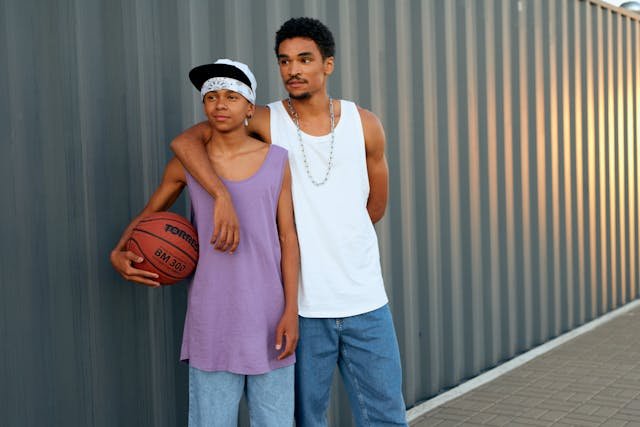
Having strong friendships is key to a child’s emotional well-being. Encourage your child to engage in activities where they can connect with others who share their interests—whether it’s sports, art, music, or gaming.
Talk to teachers and caregivers about promoting inclusivity in group activities. If children with prosthetics are treated just like everyone else, they will feel more comfortable participating without hesitation.
If your child expresses concerns about making friends, remind them that true friendships are based on personality and kindness, not physical differences.
Helping Them Set Boundaries
While some kids don’t mind questions about their prosthetic, others may find it uncomfortable or annoying. Teach your child that it’s okay to say:
- “I don’t feel like talking about my prosthetic right now.”
- “I’d rather focus on playing, not answering questions.”
Giving them the confidence to set boundaries helps them feel more in control of their interactions, rather than feeling like they always have to explain themselves.
Supporting Emotional Well-Being During Challenges
There may be times when children feel frustrated, excluded, or discouraged. How they handle these emotions shapes their resilience and self-esteem.
Helping Them Cope with Frustration
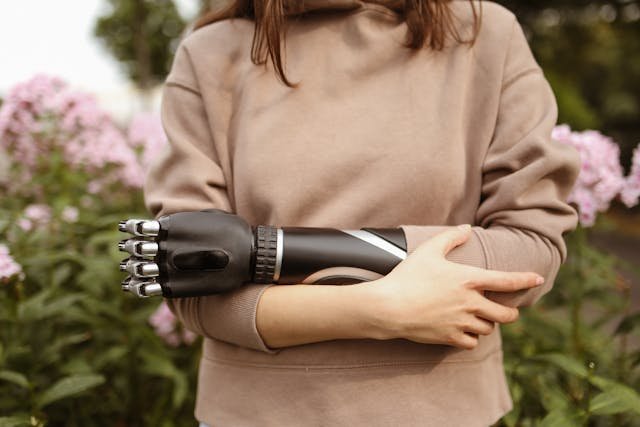
Adapting to a prosthetic limb can sometimes feel challenging or tiring. If your child expresses frustration, acknowledge their feelings while encouraging a problem-solving mindset.
Instead of saying, “Don’t be upset,” try:
- “I see that you’re feeling frustrated. Let’s take a break and try again later.”
- “I know this is hard, but look how much progress you’ve made!”
Teaching them healthy ways to manage frustration, such as deep breathing, taking breaks, or trying again with a different approach, helps them develop emotional resilience.
Addressing Feelings of Being ‘Different’
At some point, a child may say, “I wish I didn’t have to wear a prosthetic like other kids.” This is normal, and it’s important to remind them that everyone has differences—some are just more visible than others.
Talk about other successful people with prosthetic limbs, like athletes, musicians, and artists. Remind them that their prosthetic doesn’t define them—their talents, personality, and kindness do.
Recognizing When They Need Extra Support
If a child is consistently struggling with self-esteem, avoiding social situations, or showing signs of sadness, they may need extra emotional support. Talking to a counselor, support group, or mentor can help them work through these feelings in a safe and supportive environment.
No child should ever feel alone in their journey. Seeking professional support when needed ensures that they have the emotional tools to thrive in every aspect of life.
Creating a Strong Support System for Your Child
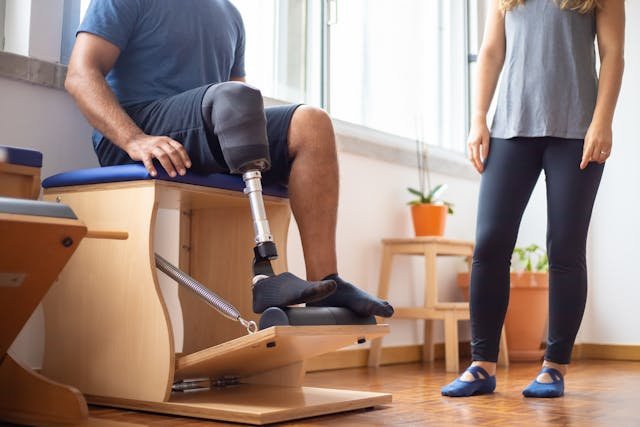
No child should feel alone in their journey. Surrounding them with positive role models, supportive family members, and inclusive communities helps them develop a strong sense of belonging and confidence.
Building a Supportive Home Environment
Children look to their parents and caregivers for emotional security and guidance. A supportive home environment where they feel safe, understood, and encouraged makes all the difference in their self-esteem.
Ways to create a positive home atmosphere:
- Normalize their prosthetic limb by treating it as just another part of their body.
- Encourage open conversations where they feel comfortable discussing their feelings.
- Celebrate their strengths and individuality, helping them see their prosthetic as an empowering tool, not a limitation.
A home filled with love, encouragement, and acceptance lays the foundation for strong self-confidence and emotional resilience.
Connecting with Other Kids with Prosthetics
Sometimes, children feel like they are the only ones using a prosthetic limb. Meeting other kids who share similar experiences can help them feel less isolated and more understood.
Consider joining:
- Local or online support groups for children with prosthetics.
- Adaptive sports teams where kids with prosthetic limbs can play together.
- Events or workshops that bring together families of children with limb differences.
Building connections with others who understand their journey helps kids see that they are not alone and that prosthetics are just another way of moving through life.
Introducing Positive Role Models
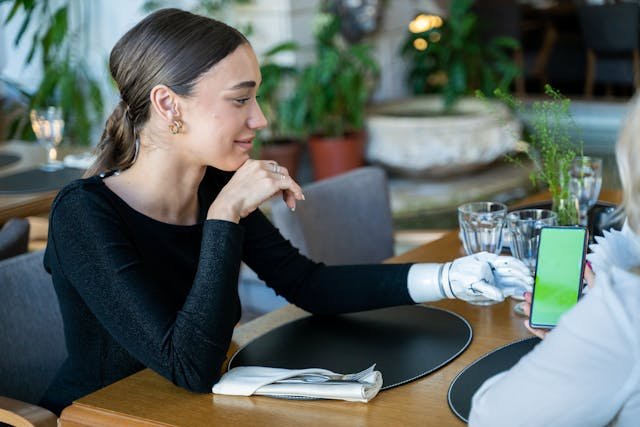
Seeing successful, confident individuals with prosthetic limbs can inspire children to dream big and believe in themselves.
Share stories about athletes, artists, musicians, and professionals who have excelled with prosthetics. Some inspiring figures include:
- Deepa Malik, a Paralympic medalist from India.
- Hugh Herr, a rock climber and engineer who designs advanced prosthetic limbs.
- Nick Vujicic, a motivational speaker born without limbs, who encourages self-acceptance.
By showing children that people with prosthetics can achieve anything, they are more likely to embrace their own potential and chase their dreams confidently.
Encouraging Schools and Communities to Be More Inclusive
Schools and social environments play a huge role in a child’s emotional well-being. Educators and peers who embrace inclusivity make children feel valued, accepted, and empowered.
Educating Teachers and Classmates About Prosthetics
Not everyone knows how to interact with a child using a prosthetic limb. Some children may ask insensitive questions out of curiosity, while some teachers may unknowingly exclude a child from activities.
By working with schools to promote awareness and inclusivity, you can help create a more supportive environment. Ways to do this include:
- Encouraging teachers to talk openly about limb differences to normalize prosthetics.
- Organizing disability awareness programs where children can learn about inclusivity.
- Helping classmates understand that a prosthetic doesn’t mean a child is less capable.
When schools foster a culture of acceptance, children with prosthetic limbs feel more comfortable participating in activities and forming friendships.
Ensuring Equal Participation in Activities
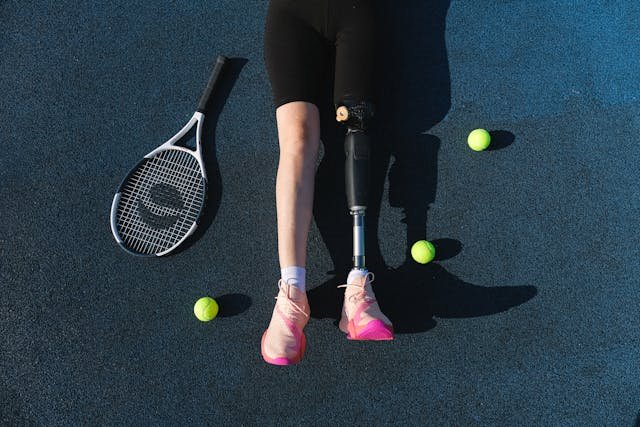
Children should never feel left out of sports, games, or school events because of their prosthetic limb. Talk to teachers and coaches about:
- Adapting physical activities so that all children can participate comfortably.
- Encouraging classmates to see abilities rather than limitations.
- Providing accommodations where needed, such as extra time or modified equipment.
When children feel included, they develop higher self-esteem and a stronger sense of belonging.
Teaching Peers How to Be Supportive Friends
Sometimes, classmates don’t know how to support or include a child with a prosthetic limb. Encouraging open and respectful conversations can help peers understand:
- How to ask respectful questions without making a child feel different.
- That a prosthetic limb does not define a person’s abilities.
- That inclusion means treating everyone with kindness and fairness.
Teaching these values helps children with prosthetic limbs feel more accepted and comfortable in social situations.
Helping Kids Develop a Positive Mindset About Their Future
One of the greatest gifts you can give a child is a belief in their own potential. By fostering a positive, goal-oriented mindset, you can help them overcome obstacles and embrace life with confidence.
Encouraging Them to Pursue Their Passions
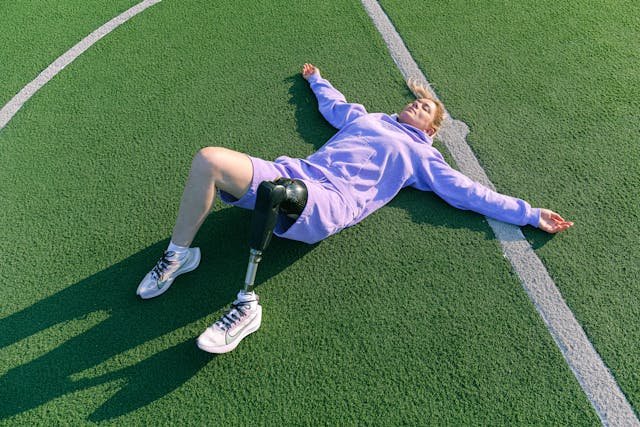
A prosthetic limb should never stop a child from doing what they love. Encourage them to explore activities like:
- Sports, such as swimming, running, or martial arts.
- Creative arts, like painting, music, or theater.
- STEM fields, where they can invent, build, or design.
By supporting their passions and ambitions, children see that they can excel in anything they set their minds to.
Teaching Resilience and Perseverance
Life will have its challenges, and children need to know that it’s okay to face setbacks. Teaching resilience helps them handle:
- Moments of frustration when learning a new skill.
- Situations where they feel different or self-conscious.
- Times when they need adjustments to their prosthetic.
Encourage them to see challenges as opportunities to grow, rather than as obstacles. When they develop a strong, determined mindset, they become more independent and confident in their abilities.
Reinforcing That They Are More Than Their Prosthetic
While a prosthetic limb is part of a child’s life, it does not define who they are. Remind them that their kindness, intelligence, creativity, and personality are what truly matter.
Help them see that:
- Their prosthetic limb is just a tool that helps them do amazing things.
- Their abilities go far beyond their physical differences.
- They are capable, strong, and just as valuable as anyone else.
By reinforcing these ideas, children grow up with a healthy self-image and unshakable confidence.
Final Thoughts: Empowering Kids to Live with Confidence and Joy
Helping children with prosthetic limbs build confidence, navigate social situations, and manage emotions ensures that they grow up feeling strong, capable, and valued. Every child deserves to be treated with kindness and encouragement, and with the right support, they can embrace their prosthetic limb as a tool of empowerment rather than a limitation.
At Robobionics, we are dedicated to helping children feel comfortable, confident, and independent in their prosthetic journey. Whether it’s choosing the right prosthetic, offering expert guidance, or providing long-term support, we are here to ensure that every child thrives in life with joy and confidence.
🚀 Looking for expert guidance on social and emotional support for your child? Book a free consultation with our team today!
💡 Have questions about prosthetic care, confidence-building, or inclusive activities? Contact us now, and let’s help your child move forward with happiness and self-assurance!



